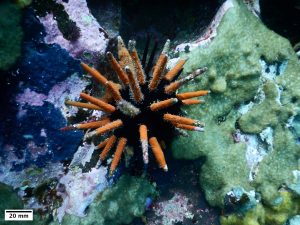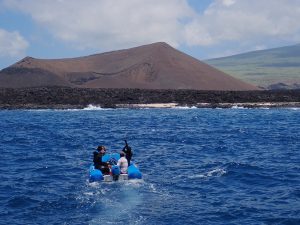Dr. John Bruno, Professor in the Department of Biology at UNC, is the co-author of a recent publication looking into pencil sea urchin populations in Galapagos and how they adapt to their local temperature. Lead author and GSC researcher Isabel Silva Romero and team recently published their findings in Marine Biology titled “Local conditions influence thermal sensitivity of pencil urchin populations (Eucidaris galapagensis) in the Galápagos Archipelago.”
In this work, pencil sea urchin populations at warmer sites were found to have higher tolerance for warmer temperatures, suggesting some capacity to adapt and acclimatize to ocean warming. This finding could also help explain how this ubiquitous species is so successful across the Galapagos archipelago, thriving in a wide range of environmental conditions.
For this study the team tested the hypothesis that the thermal sensitivity of ectotherms varies directionally across a temperature gradient. This was done by comparing Thermal Performance Curves (TPC) based on temperature-specific individual respiration rates of the conspicuous pencil sea urchin at four sites ranging in thermal history in the Galapagos Islands. The team took advantage of the natural and highly variable oceanic conditions of the archipelago, where the convergence of currents and the El Niño-Southern Oscillation cycle (ENSO) results in variation of the sea surface temperature across space and time. The pencil urchin was selected for study as this species is one of the most significant mesograzers and bioeroders in the system.
 Their findings showed that urchin populations at warmer locations were more tolerant of high temperatures than cooler site populations, suggesting they have some capacity to adapt and acclimatize to their local thermal conditions. This could help explain how this ubiquitous species is so dominant across the shallow rocky reefs of the archipelago, thriving in a wide range of environmental conditions. However, ocean warming is linked to increased metabolism of ectotherms; and in cases where species are dominant community members, increased predation with warming (in this case, on macroalgae beds) can lead to wide-ranging changes in community state and functioning. Nowadays, studies of thermal responses in the face of anthropogenic heating are crucial to determine the fate of marine ecosystems.
Their findings showed that urchin populations at warmer locations were more tolerant of high temperatures than cooler site populations, suggesting they have some capacity to adapt and acclimatize to their local thermal conditions. This could help explain how this ubiquitous species is so dominant across the shallow rocky reefs of the archipelago, thriving in a wide range of environmental conditions. However, ocean warming is linked to increased metabolism of ectotherms; and in cases where species are dominant community members, increased predation with warming (in this case, on macroalgae beds) can lead to wide-ranging changes in community state and functioning. Nowadays, studies of thermal responses in the face of anthropogenic heating are crucial to determine the fate of marine ecosystems.
Read the full article here.

